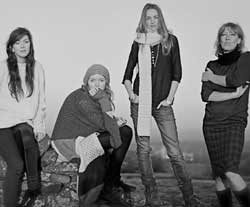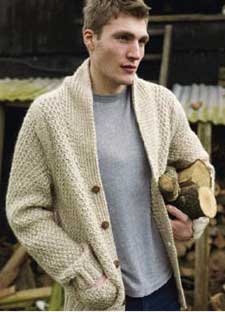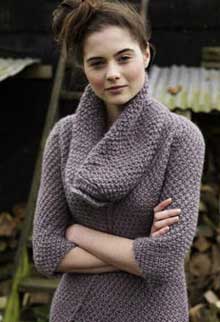|
WOOL BOARD VETOES WELFARE LABEL
An environmentally sound scheme that would promote British wool, and reflect the interest in ethical clothing that is growing by leaps and bounds, is being blocked by the very body that might have been thought to welcome it.
Isobel Davies, admittedly to be viewed with some suspicion because of her dedication to sheep welfare, has run her own farm for five years now, with a flock of some 600 rescued sheep. Due for slaughter because of age, colour of fleece, sex or other shortcomings, they were saved by Davies  and in return have provided the fleece that goes into her own collection of knitwear and garments. and in return have provided the fleece that goes into her own collection of knitwear and garments.
Isobel Davies, far right, with supporters who are using wool from her sheep to launch an accessories collection (see right).
Below, garments from her own collection, Izzy Lane, made from Wensleydale wool.
Her efforts to improve sheep welfare chimed with the interests of the mighty Tesco to extend ethical labelling for its merchandise. They were to launch a new collection using wool from British farmers. It was to be produced according to the ethical standards that Izzy holds so dear, and to be identified with the first ever animal welfare standard label.
Now, some might see this as an admirable development, in line with environmental, ecological and animal welfare concerns that all sorts of people and corporations are embracing. Unhappily, the British Wool Marketing Board does not.
Isobel Davies was initially given support by the Wool Board, which helped identify  some farmers who would be prepared to meet Ms Davies ’s strict criteria. This demanded that no sheep from their flocks would ever be live-exported; no sheep ever to be sold in livestock markets, with the exception of breeding stock; and no sheep ever to be transported for more than 120 miles or a maximum time of 3 hours, with the exception of breeding stock. These are all measures supported by the Compassion in Farming organization and other animal welfare bodies. some farmers who would be prepared to meet Ms Davies ’s strict criteria. This demanded that no sheep from their flocks would ever be live-exported; no sheep ever to be sold in livestock markets, with the exception of breeding stock; and no sheep ever to be transported for more than 120 miles or a maximum time of 3 hours, with the exception of breeding stock. These are all measures supported by the Compassion in Farming organization and other animal welfare bodies.
The farmers agreed, wool fleece was tagged up and ready to be processed. But by law, all wool in this country has to go through the British Wool Marketing Board and this was where the best laid plans for sheep and men came to grief.
The Board told Ms Davies that it “didn't think it was fair to those farmers who do not meet the criteria”. And they have issued a statement expanding on their standpoint, which points out that British sheep are already kept at high standards, that some farmers would be unable to comply with the criteria, and that this would lead to unnecessary double standards.
"This is not in the best interests of the majority of British Wool producers or in the promotion of British Wool as a quality fibre for textiles," they maintain.
Such woolly-minded thinking would not have  seen wool provide the foundation for Britain’s wealth in the Middle Ages, as symbolized by the wool sack in the Houses of Parliament upon which the Chancellor still sits. seen wool provide the foundation for Britain’s wealth in the Middle Ages, as symbolized by the wool sack in the Houses of Parliament upon which the Chancellor still sits.
There are standards established for organic foods, for eggs, meat, and any number of other farmed products. They do not have to apply to all farmers in any one section.
Much fleece from British sheep is simply burned or buried by farmers, as the price they may get for it hardly pays for the price of having it shorn, and an industry that was once known around the world for its quality is now a sad shadow of its former self
Isobel Davies wants to use some of that wool and extend her activities as well as establish a new standard to encourage better welfare for the sheep; Tesco wants to promote a new welfare label for customers that are increasingly demanding better standards; there are farmers keen to comply.
A final word of support from the chief executive of Compassion in Farming, Philip Lymbery “Compassion in World Farming is staggered that the British Wool Board should prevent a scheme to promote high welfare British wool from sheep which have not been subjected to live exports and long journey times. Sheep carried on long journeys abroad can suffer stress from exhaustion, hunger and dehydration and these journeys are unnecessary and entirely incompatible with high welfare standards. At a time when high welfare products are rapidly expanding in the marketplace, the British Wool Board should be doing all it can to promote worthy initiatives such as this”.
As we finalise this edition, we understand Tesco and Isobel Davies are seeking further talks with the British Wool Marketing Board. They may yet realise that the tide of opinion is on the side of the sheep.
|